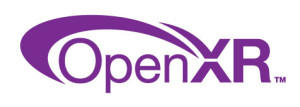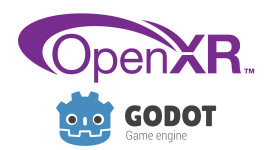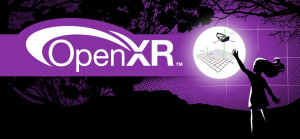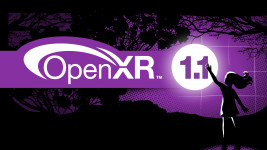In this Meta blog, Meta addresses their commitment to OpenXR and announce that with the v74 SDK, available next week, the built-in OpenXR path for all major game engines will be a recommended path for development. Developers building on Unity, Unreal and Godot can leverage OpenXR to build across platforms and access Meta platform plugins to add features unique to Horizon OS. Dive in to learn more about OpenXR paths for each engine.
Openxr tagged news
Statement from OpenXR Working Group in Response to Community Discourse on the OVRPlugin from Meta
The Khronos OpenXR Working Group recognizes the challenges developers have faced with legacy APIs and platform-specific behaviors that limit XR application portability. The Working Group is dedicated to evolving OpenXR by incorporating vendor extensions into the core specification and continues to enhance platform interoperability. Today, three major engines - Unity, Unreal, and Godot - support building OpenXR applications that are compatible with multiple vendors' OpenXR conformant devices, provided vendor-specific features are avoided.
Application developers retain the choice to target specific runtimes and devices if desired, though this approach may introduce some vendor dependencies. For guidance on building OpenXR PCVR applications on Windows without vendor dependencies:
Build immersive apps & experiences with OpenXR & Unity
This video from Android Developers, explores the OpenXR API, their partnership with Unity, and the experimental release of Unity for Android XR, including features and roadmap.
Khronos at SIGGRAPH Asia 2024: Major Announcements, Engaging Sessions, and Community Building
Khronos just returned from a dynamic and productive week at SIGGRAPH Asia 2024, which took place from December 3–6 in the bustling city of Tokyo, Japan. With key announcements, a series of well-attended Birds of a Feather (BOF) sessions, and a vibrant networking event, Khronos reaffirmed its position at the forefront of standardization for the 3D industry.
Here are some highlights of Khronos’s activities at SIGGRAPH Asia 2024, from unveiling new initiatives to fostering collaboration across the graphics, web, and XR ecosystems.
Android XR Adopts OpenXR
The Khronos Group is delighted to welcome Google’s adoption of the OpenXR open standard. This significant milestone marks a win-win, empowering AndroidXR to harness a robust content ecosystem while offering OpenXR developers access to a significantly broader audience.
Best Practices for OpenXR API Layers on Windows
PICO Officially Supports the OpenXR 1.1 Standard
Khronos at SIGGRAPH Asia 2024
Sony Extends OpenXR Compatibility to Spatial Reality Displays
Sony Electronics has released SDK version 2.4.0 for its Spatial Reality Displays, delivering powerful new tools and features designed to elevate the 3D-content creation and display experience. With the addition of multi-display support, viewer log functionality, and extended development platform compatibility, this update empowers content creators to produce even more immersive and high-impact 3D content.
Sony has expanded support for leading development platforms. SDK 2.4.0 enhances application development by expanding support for key platforms, including:
- Extended OpenXR compatibility
- Unreal Engine 5.4
- Unity Plugin DX1
These advancements make it easier for developers to integrate the Spatial Reality Display into existing workflows, enabling the creation of highly realistic 3D content with more intuitive, efficient development processes.
Integrating OpenXR with the Godot Engine and Advancing XR Development through Open Source
The Godot Engine is undergoing exciting updates as part of a Khronos-sponsored project to accelerate the integration of OpenXR functionality, marking a significant advancement in democratizing OpenXR development through open-source engines and tools.
In this blog post, we'll delve into how feature enhancements to Godot's open source engine are being made possible through the support of the Khronos OpenXR Working Group and the collaborative efforts of the open-source community.
Khronos SIGGRAPH 2024 Rewind
SIGGRAPH is one of the world’s most significant and long-standing conferences focused on computer graphics and interactive techniques. For the Khronos Group, SIGGRAPH represents an essential opportunity to connect with the developers, engineers, artists, and technical professionals that make up the primary users of Khronos standards like ANARI, glTF, OpenXR, WebGL, and Vulkan.
Through Birds of a Feather (BOF) sessions, presentations, networking events, and face-to-face member meetings at SIGGRAPH, Khronos shares new and forthcoming technical breakthroughs, gathers feedback, learns about user needs and promotes best practices. This year, Khronos hosted nine public-facing events over four days: Presentation materials and video recordings for these events are now available on the Khronos SIGGRAPH 2024 Event Page.
Khronos To Host OpenXR Live: Seattle Meetup on September 12 for Developers and Innovators in XR Technology
OpenXR Issues RFP for Godot Integration
The OpenXR Working Group wishes to expand and demonstrate the reach of the API Standard by better integrating OpenXR with the Godot game engine to effectively bridge the gap between runtime developers and application developers.
Stepping Up: The Floor Is Yours with promotion of the XR_EXT_local_floor extension to OpenXR 1.1 Core
The XR_EXT_local_floor extension recently made its way into the core specification with the release of OpenXR 1.1. This blog post, delves into the technical aspects of the LOCAL_FLOOR[1] reference space. While STAGE space is still available to developers for defining playspace bounds, we will show how LOCAL_FLOOR offers a convenient alternative for obtaining a recenterable floor space that does not require user calibration. Additionally, we explore how this extension includes an estimated floor height, adding further convenience to XR development workflows.
Khronos Releases OpenXR 1.1 to Further Streamline Cross-Platform XR Development
The Khronos Group announces the immediate availability of the OpenXR 1.1 specification. This release evolves the widely adopted OpenXR open API standard for high-performance, cross-platform access to VR, AR, and mixed reality (MR) — collectively known as XR—platforms and devices. OpenXR 1.1 consolidates widely used API extensions into the core specification to reduce fragmentation and adds new functionality to streamline the development of more powerful and efficient XR applications. Along with five extensions being incorporated in the core specification, feature enhancements include interaction profile enhancements, universal fundamental tools for building enhanced XR experiences, new error codes, and specification refinement.


 The Khronos Group will have a significant presence at SIGGRAPH Asia 2024. The event will take place from 3 – 6 December 2024 in Tokyo, Japan. Attendees will be able to attend the Khronos Fast Forward and BOFs from glTF, OpenXR, Vulkan and Slang. In addition, there will be a joint BOF between the Khronos Group and W3C on how they are cooperating with synergistic standards such as WebXR, OpenXR, WebGPU, WebGL and glTF.
The Khronos Group will have a significant presence at SIGGRAPH Asia 2024. The event will take place from 3 – 6 December 2024 in Tokyo, Japan. Attendees will be able to attend the Khronos Fast Forward and BOFs from glTF, OpenXR, Vulkan and Slang. In addition, there will be a joint BOF between the Khronos Group and W3C on how they are cooperating with synergistic standards such as WebXR, OpenXR, WebGPU, WebGL and glTF.



